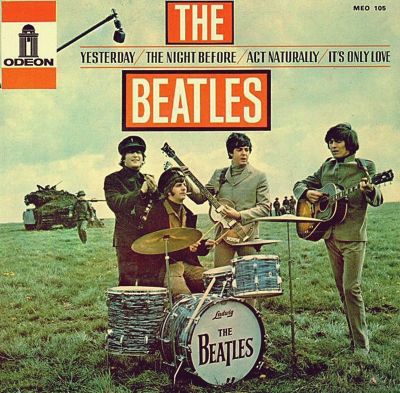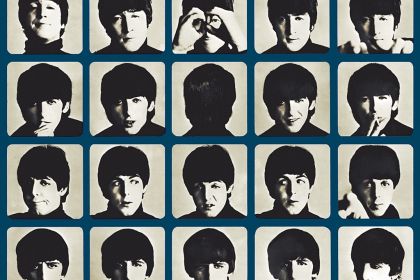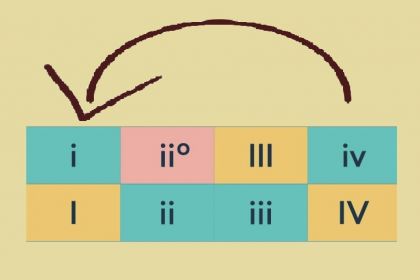Music Theory
Beatles songs featuring Lydian mode

The Beatles EP cover
One of the main reasons for the long-term popularity of The Beatles songs is undoubtedly their developed and varied harmonic structure, composed in most cases according to the canons of tonal theory. This classic songwriting approach makes the tracks easily comprehensible to the widest audience and also contributes to the quick memorization of songs.
Of the 167 songs The Beatles wrote for their 13 studio albums, about a half reveal chord progressions that follow tonal theory. The harmonic analysis of these compositions clearly identifies the six diatonic modes as well as their modifications used by The Beatles in their diverse music.
Predictably, The Beatles utilized Ionian and Aeolian modes most frequently as the two generally dominate classical and pop music due to their structural versatility. The Mixolydian and Dorian modes appear less often in The Beatle's output, and the same can be said about the harmonic minor and harmonic major scales. Phrygian and Lydian modes can be considered the rarest.
The harmonic structure of Things We Said Today—the only Beatles song featuring Phrygian chords—is detailed in this article.
The perfect Beatles example of the Lydian mode is observed in George Harrison's track I Want To Tell You. In the harmonic analysis of the songs chord chains, the scale degrees (denoted with Roman numerals) show the following progressions in A Lydian:
- A–B–E7–A or I–II–V7–I
- Bm–Dm–A–B7–Bm–Dm–A or ii–iv–I–II7–ii–iv–I
The first chord chain consists of all three major chords in the Lydian mode and represents the II–V–I cadence heavily used in classical music to complete musical sections. Note that the Dm minor subdominant chord replaces a diminished chord rooted in the fourth scale degree of the Lydian mode, and the chord alternation Bm–Dm switches the Lydian mode to the harmonic major.
Listen to I Want To Tell You by The Beatles:
The Beatles' There's A Place shows a classic example of combining two diatonic modes in different song sections. The verses are composed in E Ionian on the following chord progressions:
- E–A–E–A–E–C♯m–B7 or I–IV–I–IV–vi–V7
- A–G♯m–A–G♯m–B7–C♯m or IV–iii–IV–iii–V7–VI
- E–A–E–A–E–C♯m–B7 or I–IV–I–IV–vi–V7
- G♯m–A–B7–E or iii–IV–V7–I
Note the canonical use of the V7–VI deceptive cadence and the IV–V7–I perfect authentic cadence closing the second and fourth progressions, respectively.
In the choruses, the major mode switches to E Lydian showing the following progressions:
- C♯m–F♯–E–G♯m or vi–II–I–iii
- C♯m–F♯–E–G♯m–C♯m–G♯m–C♯m or vi–II–I–iii–vi–iii–vi
The variation of diatonic modes is intended to generate different moods in adjacent song sections and is not uncommon in both classical and pop music.
Listen to There's a Place by The Beatles:
Lydian mode is also found in The Beatles covers including Johnny Russell's country hit Act Naturally sung by Ringo Starr and released on the 1965 Help! The song is based on the chord progressions composed in G Ionian and G Lydian modes:
- G–C–G–D7–G–C–D7–G or I–IV–I–V7–I–IV–V7–I for verses;
- D7–G–A7–D7 or V7–I–II7–V7 for choruses.
The Lydian mode appears in the choruses and is used in a similar way to I Want To Tell You. The song verses feature three primary major chords of the Ionian mode with the IV–V7–I most powerful classical cadence at the end of the stanza.
Listen to Act Naturally (Remastered 2009) performed by The Beatles:
A detailed analysis of the Lydian mode and examples of its application in songwriting are explained in this article.
Explore how The Beatles uses other musical modes in our articles:
- Beatles songs with Dorian mode
- Things We Said Today: the only Beatles song featuring Phrygian mode
- Beatles songs with harmonic minor and Aeolian modes
- 9 Beatles songs that combine harmonic major with Ionian mode
- Beatles songs composed with just three primary chords
- Picardy third: cadence for a happy ending in classical music and popular songs
- 50 Beatles songs using Ionian mode
Discover more songs composed in Lydian major mode and check out their harmonic analysis in the following articles:
- Peace Frog: the only Doors song featuring Lydian mode
- Lost for Words: Pink Floyd's only Lydian song
- Reelin' In the Years: the tandem of effective lyrics and one of the best guitar solos of all time
- The Bells of Rhymney: two major modal modes of famous protest song



